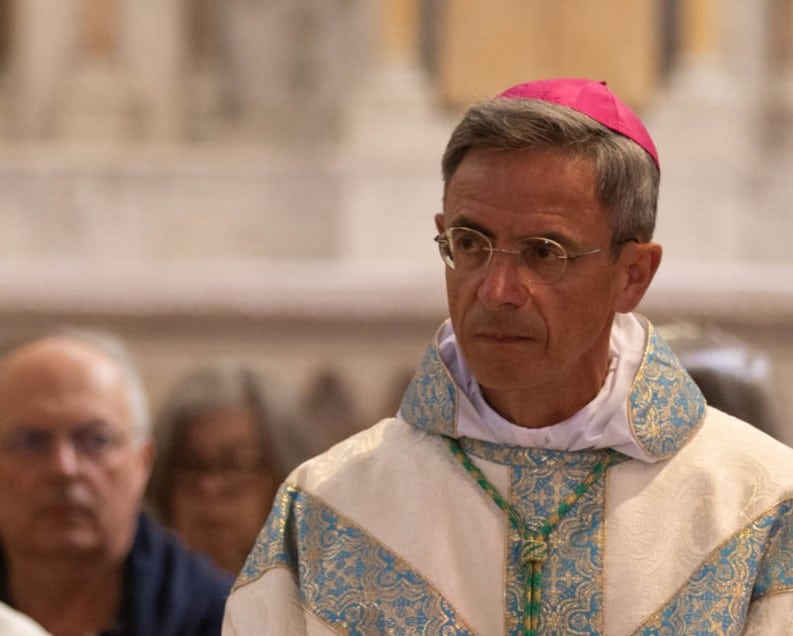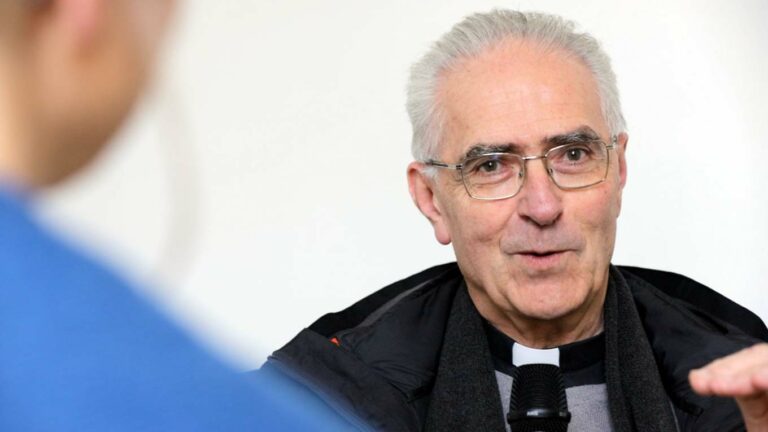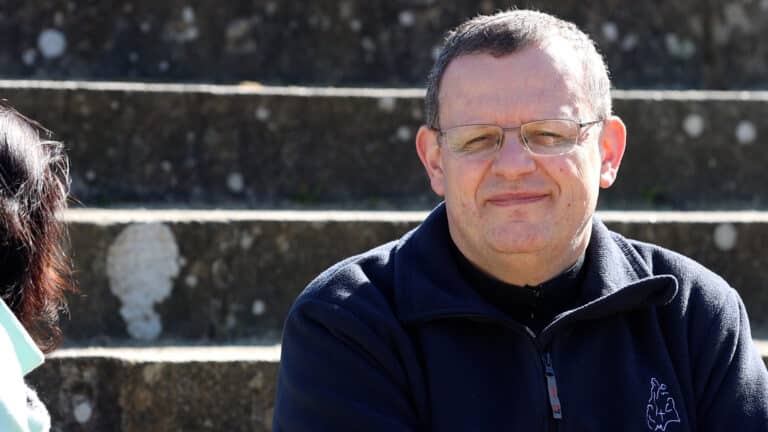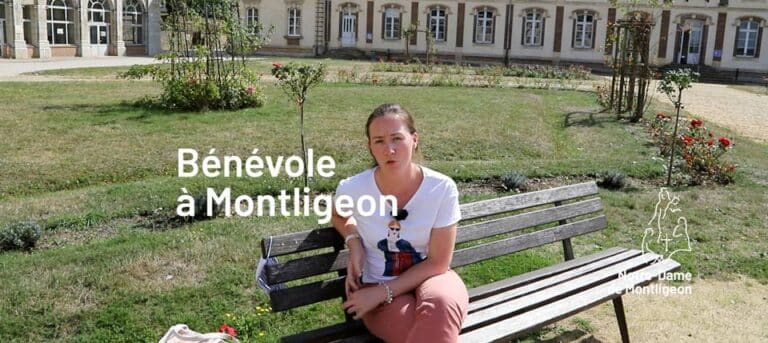Montligeon is a shrine that is blessed by the ongoing prayers for the deceased taking place here. Thus, the topic of the end of life is of vital interest to the people who come and visit it. This autumn, France will look into a law project aiming at legalising assisted suicide and euthanasia. Why should we fight it and how?
Excerpts from the Conference on the topic by Msgr Bozo, Bishop of Limoges, guest of honour at the shrine of Montligeon on 15th August 2023.
Why should we fight euthanasia and assisted suicide?
Because legalisation of euthanasia and assisted suicide, which, contrary to common belief, is currently practised by only a handful of countries worldwide (a few states in the USA, Canada, Colombia and, in Europe, Spain, Portugal, Belgium, Switzerland, the Netherlands and Luxembourg), represents an absolute break with our way of living in society, as with the mutual trust that it implies, and the killing prohibition that is one of the founding forbiddings to our civilisations.
Let us first consider the arguments in favour of euthanasia. I have identified five (three are theoretical and two are based on experience).
First theoretical argument: the desire to control one’s own death
First theoretical argument: the will to control one’s death
“I must be able to freely choose the moment of my death”.
Yet our death does not belong to us, no more than our life. Claiming the right to control one’s own death is individualism at its utmost. “Each one determines his or her own standards, and, amidst general self-determination , one is unable to help another, still less help him or her progress” (Cardinal Ratzinger, “Conscience and Truth”, Communio, XXXI, 1, January-February 1996, p. 105). So then, what place do my closest ones hold? Does my life only concern myself? What is being outlined here is a non-human world.
Second theoretical argument: public general opinion seems to overwhelmingly be in favour of euthanasia
With regard to the public overwhelming majority being in favour of euthanasia, we need to look closely at the questions asked, which more or less all revolve around an alternative of the following type: “Would you prefer to die in excruciating pain or to decide on your own end of life”? Basically, what the polls reveal is that people do not want to be subjected to pain, or to unreasonable obstinacy and prolonged therapy. The Church totally agrees with that.
Third theoretical argument: euthanasia is an individual right that takes nothing away from anyone
The claim that euthanasia is an individual right that neither constrains nor pressurises anyone is either a lie or a naive delusion. How can one think that an elderly and sick person will not feel burdensome and ask for his or her life to end so as to no longer be a charge for loved ones or the community? Moreover, how can one not be inclined to think that the cost of caring for the elderly shall not insidiously end up encouraging people to abbreviate the lives of those who cost such money and energy?
Fourth argument (based on experience): old age waning and illness
Old age waning and changes occurring with growing old can be quite challenging. But they raise the question of what defines a life worth as living… To consider one’s dignity in terms of performance and abilities is to covey both a terrible and menacing message to people who are disabled, vulnerable or unproductive… Or even to people who think they are too wrinkled and no longer like their image.
I would like to share with you the meditation from the 10th station of the magnificent Way of the Cross at the WYD in Lisbon, that took place at Edward VII Park, in the presence of the Holy Father and hundreds of thousands of young people.
Jesus is stripped of his clothes
We live in a society of mirrors where what counts is appearance, image. Selfies and more selfies. The tyranny of the right body and the perfect smile. One’s carefully studied poses posted on social medias. And artificial posts awaiting “likes”. The terrible feeling of not being able to be oneself, of having to marchandise oneself to be liked and not be isolated. Levels of narcissism that, ultimately, leaves us stranded.
And there You are, Lord, on the Cross, naked, equal to Yourself, unashamed of what You are. You did not lead Your life pretending, but for good. Teach me, Lord.
They stripped You, Lord, they removed Your clothes. I look at You, serene and confident in Your naked truth. Despite being naked, You remain who You are because You never built an image of Yourself. You, in Your humility and in Your integrity. In Your truth.
But we live in a world of mirrors where all that matter is our appearance, our image. Selfies after selfies. The tyranny of the right body and the perfect smile. Photos of us on social media in carefully studied poses. Artificial posts waiting for likes. A terrible feeling of not being allowed to be ourselves, of having to sell ourselves so that people appreciate us and we are not left isolated. Narcissism that, in the end, leaves us alone on distant islands.
But You stand naked, just Yourself, unashamed of who You are. You lived not for Your image but for Good. Teach me, Lord. Give me the strength to be different, not to be a slave to my image, but to live according to my conscience.
Fifth argument (based on experience): some pains are just unbearable
Intense suffering, which must be fought as much as possible, cannot be cured by being given death. Giving death is obviously not a cure. Doctors and carers attest to it and bear witness to it in every possible way. Furthermore, legal experts point out that changing the law would not entail changing the Public Health Code, but the (French) Code of Criminal Procedure…
Yet, care does exist, and medical progress is also being made in the field of analgesics. The skill of palliative care is to dose them in such a way as to provide relief while altering consciousness as little as possible, so that people at the end of life can undertake the “labour of dying”.
In his interview with the shrine’s magazine last year, Erwan Le Morhedec (a lawyer opposed to euthanasia) stated: “In my readings, I came across the wording of ‘labour of death’, which made me think of the ‘labour room’ for childbirth, on the other part of life. This labour (of death) is maybe the final attempt to totally come into the world, to bring one’s own life to its fulfilment.”
There remains what medical doctor call the “refractory suffering”. In response to this, the last law on the end-of-life, known as the Claeys-Léonetti Act (2016), affords the possibility of deep and continuous sedation until death. Thus, under very strict and highly regulated conditions, consciousness gets altered in order to avoid suffering, but without killing. The intention is not the same. This is crucial.
I have briefly reviewed the arguments for advocating euthanasia. In the face of strong opposition from the medical profession and the major voicing that have been raised, the (French) government is promising a very restrictive law, with a very tight framework.
We know with certainty that such a law, which would supposedly apply to a few extreme cases, would not stand at such. In all the countries that have legalised euthanasia, the restrictive conditions are being lifted one after the other, being made more flexible, extending to children, to people suffering from depression, and ultimately to all those who are tired of living… The danger is far-reaching. It will lead to an alteration of conscience about human dignity, to an obvious decline in civilisation.
What can we do to counteract?
We may think that the die has been cast and that we can only but keep fingers crossed.
But this is not what the God of the living expects from us. Let us make ours the zele of Saint Augustine: “If the Lord does not find me victorious, let Him at least find me a fighter” (Saint Augustine, Confessions).
What are our weapons?
– Prayer
– Dialogue
– Political wrestling. It is a peaceful fight, but it does not mean that the fight should be weak. Get informed and formed, write to your MP’s. It’s expensive, it takes time, but it’s our duty. We do not have the right to remain silent. Sign petitions. Perhaps even consider demonstrating…




